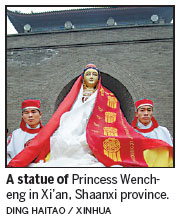
Although Buddhism arrived in the region around the mid-7th century, when Princess Wencheng of the Tang Dynasty (AD 618-907) left Chang'an (present-day Xi'an, Shaanxi province) to marry Songtsan Gambo, king of the Tubo kingdom, the present-day Tibet autonomous region, about 3,000 kilometers to the west.
Seeing that Buddhism, which flourished during the Tang period, had not spread to the Tubo Kingdom, the princess promoted the building of temples and donated pagodas, scriptures and statues of the Buddha she had brought with her.
The Ramoche Temple was the first to be built, and the princess named the eight surrounding mountains after the eight auspicious symbols of Buddhism, which are still in use today, thus paving the way for the religion to spread within Tubo. Goats were mobilized to carry earth to fill in a pond for the construction of the Jokhang Temple, and the main hall contains a statue of Sakyamuni, an alternative title for the Buddha, that Wecnhang had taken to Tubo.
Built in the 8th century, the Samye Monastery in Dranang, Shannan prefecture, was the first Buddhist monastery in Tibet. Construction began in approximately AD 775 under the patronage of King Trisong Detsen who sought to revitalize the religion, which had been in decline since its introduction a century before.
In the centuries that followed, the religion began to take root, aided by an infusion of the Indian form of Buddhism.
Historical, geographical and political factors have crystallized Tibetan Buddism into four major schools: Nyingma, Kagyu, Sakya and Gelukpa. All comply with the fundamental teachings of the Buddha, but they vary slightly in style or interpretation as a result of different masters' interpretations of important scriptures.
Representative monasteries of the four schools include the Mindrolling Monastery, in Dranang county, Lhokha prefecture, founded in the late 10th century, which adheres to the Nyingma Shool. Kagyu is represented by the Tsurpu Monastery in Doilungdeqen county, founded in 1159. The Sakya Monastery, the seat of the Sakya School, was founded in 1073, and the Gadan Monastery, founded in 1409, in Lhatse county, 57 km east of Lhasa, is the Gelukpa Schools's oldest and most-prestigious monastery.